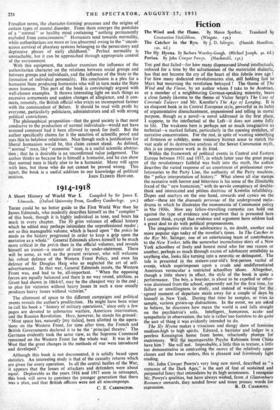Fiction
The Wind and the Flame. By Manes Sperber. Translated by Constantine FitzGibbon. (Wingate. i s-s.) THE god that failed—for how many dispossessed liberal intellectuals, reduced for a time by the salvationism of the materialist dialectic, has that not become the cry of the heart of this febrile iron age. J. For liow many dedicated revolutionaries also, still holding fast to Marx but mourning the revolution betrayed ! The -theme of The Wind and the Flame, by an author whom f take to be Austrian,• or a member of a neighlfouring German-speaking minority, bears
a close family likeness to the theme of Victor Serge's The Case of Comrade Tulayev and Mr. Koestler's The Age of Longing. It is an eloquent book in its Central European style, powerful in its habit • of argumentative disenchantment, impassioned and telling in moral ' purpose, though as a novel—a novel addressed in the first place, I suppose, to the intellectual of the Left—it does not come fully to life. The weakness here is perhaps not so much imaginative as technical—a marked failure, particularly in the opening stretches, of narrative concentration. For the rest, in spite of wanting something of firmness or subtlety, some visionary human sense to match the vast scale of its destructive analysis of the. Soviet Communist myth, this is an impressive work in its kind.
Within the framework of political events in Central and Eastern. Europe betsVeen 1931 and 1937, in which latter year the great purge of the revolutionary faithful was built into the myth, the author describes the varied response of an assortment of professional revo- lutionaries to the Party Line, the authority of the Party machine, the " police interpretation of. history." What above all else stamps the narrative with horror and bitterness is his sense of the illimitable fraud of the " new humanism," with its servile conspiracy of double,- think and intoxicated and pitiless doctrine of Kremlin infallibility.• Dupes and martyrs on the one hand, cowards and cynics on the other—these are the dramatis personae of the underground melo- drama in which he illustrates the monomania of Communist policy • in Ithe 1930s. How any fellow-travelling romantic can hold out against the type of evidence and argument that is presented here • I cannot think, except that evidence and argument have seldom had a great deal to do with political prepossessions.
The imaginative return to adolescence is, no doubt, another and more popular sign today of the novelist's times. In The Catcher in the Rye Mr. Salinger, one of an entertaining team of contributors "to the New Yorker, tells the somewhat inconclusive storY,of a New York schoolboy of lively and honest mind who for one reason or another, perhaps as much through excess of adolescent sensibility as anything else, looks like turning into a neurotic or delinquent.. The tale is presented in the sixteen-year-old's first-person recital of events, which superimposes upon a crude and undifferentiated American vernacular a restricted schoolboy idiom. Altogether, though a little showy in effect, the style of 'the book is quite a performance. The boy, a boarder, is about to be expelled or other- wise dismissed from the school; apparently not for the first time, for: failure or unwillingness to study, and instead of waiting for the:, — agreed moment of departure steals away for a couple of days, by himself in New York. During that time he samples, or tries to, sample, various grOwn-up distractions. In the event, we are asked .• to believe, he discovers how mean the world is and falls straight on the psychiatrist's sofa. Intelligent„,humorous, acute, and sympathetic iii observation, the tale is rather too formless to do quite the sort of thing it was evidently intended to do.
The Sly Hyena makes a vivacious and slangy show of feminine medium-high to high spirits. Edyrard, a barrister and lodger in a peerless Kensington home from home, reluctantly plumps for matrimony. Will the incomparable Psyche Robinson from China have him ? She will not. Improbable, a little thin in texture, a little too 'demonstrative in contrasting the mores of the relatively upper classes and the lower orders, this is pleasant and frivolously light reading.
Mr. John Cowper Powys's very long new novel, described as " a romance of the Dark Ages," is the sort of feat of sustained and purposeful fancy that intimidates by its high seriousness. I recognise Mr. Powys's qualities, but have always wished, from A Glastonbury Romance onwards, they needed fewer and more prosaic words for






























 Previous page
Previous page